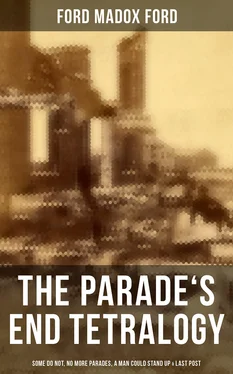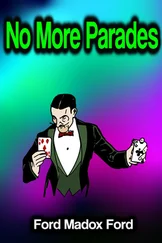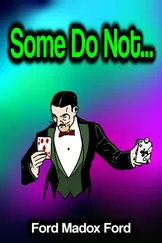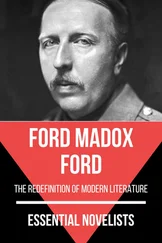‘Don’t,’ the priest said, ‘introduce the sacred name into an affair of Piccadilly bad girls . . . ’ He stopped. ‘Heaven help me,’ he said again, ‘don’t ask me to answer the question of what you should or shouldn’t have done. You know I loved your husband like a brother, and you know I’ve loved you and Sylvia ever since she was tiny. And I thank God that I am not your spiritual adviser, but only your friend in God. For if I had to answer your question I could answer it only in one way.’ He broke off to ask: ‘Where is that woman?’
Mrs Satterthwaite called:
‘Sylvia! Sylvia! Come here!’
A door in the shadows opened and light shone from another room behind a tall figure leaning one hand on the handle of the door. A very deep voice said:
‘I can’t understand, mother, why you live in rooms like a sergeants’ mess.’ And Sylvia Tietjens wavered into the room. She added: ‘I suppose it doesn’t matter. I’m bored.’
Father Consett groaned:
‘Heaven help us, she’s like a picture of Our Lady by Fra Angelico.’
Immensely tall, slight and slow in her movements, Sylvia Tietjens wore her reddish, very fair hair in great bandeaux right down over her ears. Her very oval, regular face had an expression of virginal lack of interest such as used to be worn by fashionable Paris courtesans a decade before that time. Sylvia Tietjens considered that, being privileged to go everywhere where one went and to have all men at her feet, she had no need to change her expression or to infuse into it the greater animation that marked the more common beauties of the early twentieth century. She moved slowly from the door and sat languidly on the sofa against the wall.
‘There you are, Father,’ she said. ‘I’ll not ask you to shake hands with me. You probably wouldn’t.’
‘As I am a priest,’ Father Consett answered. ‘I could not refuse. But I’d rather not.’
‘This,’ Sylvia repeated, ‘appears to be a boring place.’
‘You won’t say so to-morrow,’ the priest said. ‘There’s two young fellows . . . And a sort of policeman to trepan away from your mother’s maid!’
‘That,’ Sylvia answered, ‘is meant to be bitter. But it doesn’t hurt. I am done with men.’ She added suddenly: ‘Mother, didn’t you one day, while you were still young, say that you had done with men? Firmly! And mean it?’
Mrs Satterthwaite said:
‘I did.’
‘And did you keep to it?’ Sylvia asked.
Mrs Satterthwaite said:
‘I did.’
‘And shall I, do you imagine?’
Mrs Satterthwaite said:
‘I imagine you will.’
Sylvia said:
‘Oh dear!’
The priest said:
‘I’d be willing to see your husband’s telegram. It makes a difference to see the words on paper.’
Sylvia rose effortlessly.
‘I don’t see why you shouldn’t,’ she said. ‘It will give you no pleasure.’ She drifted towards the door.
‘If it would give me pleasure,’ the priest said, ‘you would not show it me.’
‘I would not,’ she said.
A silhouette in the doorway, she halted, drooping, and looked over her shoulder.
‘Both you and mother,’ she said, ‘sit there scheming to make life bearable for the Ox. I call my husband the Ox. He’s repulsive: like a swollen animal. Well . . . you can’t do it.’ The lighted doorway was vacant. Father Consett sighed.
‘I told you this was an evil place,’ he said. ‘In the deep forests. She’d not have such evil thoughts in another place.’ Mrs Satterthwaite said:
‘I’d rather you didn’t say that, Father. Sylvia would have evil thoughts in any place.’
‘Sometimes,’ the priest said, ‘at night I think I hear the claws of evil things scratching on the shutters. This was the last place in Europe to be Christianised. Perhaps it wasn’t ever even Christianised and they’re here yet.’
Mrs Satterthwaite said:
‘It’s all very well to talk like that in the day-time. It makes the place seem romantic. But it must be near one at night. And things are bad enough as it is.’
‘They are,’ Father Consett said. ‘The devil’s at work.’
Sylvia drifted back into the room with a telegram of several sheets. Father Consett held it close to one of the candles to read, for he was short-sighted.
‘All men are repulsive,’ Sylvia said; ‘don’t you think so, mother?’
Mrs Satterthwaite said:
‘I do not. Only a heartless woman would say so.’
‘Mrs Vanderdecken,’ Sylvia went on, ‘says all men are repulsive and it’s woman’s disgusting task to live beside them.’
‘You’ve been seeing that foul creature?’ Mrs Satterthwaite said. ‘She’s a Russian agent. And worse!’
‘She was at Gosingeaux all the time we were,’ Sylvia said. ‘You needn’t groan. She won’t split on us. She’s the soul of honour.’
‘It wasn’t because of that I groaned, if I did,’ Mrs Satterthwaite answered.
The priest, from over his telegram, exclaimed: ‘Mrs Vanderdecken! God forbid.’
Sylvia’s face, as she sat on the sofa, expressed languid and incredulous amusement.
‘What do you know of her?’ she asked the Father.
‘I know what you know,’ he answered, ‘and that’s enough.’
‘Father Consett,’ Sylvia said to her mother, ‘has been renewing his social circle.’
‘It’s not,’ Father Consett said, ‘amongst the dregs of the people that you must live if you don’t want to hear of the dregs of society.’
Sylvia stood up. She said:
‘You’ll keep your tongue off my best friends if you want me to stop and be lectured. But for Mrs. Vanderdecken I should not be here, returned to the fold!’
Father Consett exclaimed:
‘Don’t say it, child. I’d rather, heaven help me, you had gone on living in open sin.’
Sylvia sat down again, her hands listlessly in her lap. ‘Have it your own way,’ she said, and the Father returned to the fourth sheet of the telegram.
‘What does this mean?’ he asked. He had returned to the first sheet. ‘This here: ” Accept resumption yoke “?’ he read, breathlessly.
‘Sylvia,’ Mrs Satterthwaite said, ‘go and light the spirit lamp for some tea. We shall want it.’
‘You’d think I was a district messenger boy,’ Sylvia said as she rose. ‘Why don’t you keep your maid up? . . . It’s a way we had of referring to our . . . union,’ she explained to the Father.
‘There was sympathy enough between you and him then,’ he said, ‘to have bywords for things. It was that I wanted to know. I understood the words.’
‘They were pretty bitter bywords, as you call them,’ Sylvia said. ‘More like curses than kisses.’
‘It was you that used them then,’ Mrs Satterthwaite said. ‘Christopher never said a bitter thing to you.’
Читать дальше












